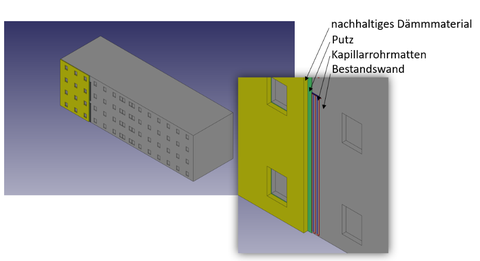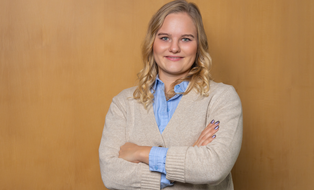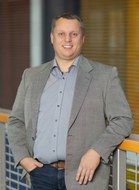AktivDHKS
Inhaltsverzeichnis
Basisdaten
| Status | laufend |
|---|---|
| Fördermittelgeber | Bundesministerium für Wirtschaft und Klimaschutz |
| Förderkennzeichen | 03EN1092A |
| Laufzeit | 2024 - 2027 |
Zusammenfassung

Aufbau Systemlösung AktivDHKS
Das übergeordnete Ziel des Forschungsvorhabens ist die nachhaltige und wirtschaftliche Sanierung des Gebäudebestandes unter der Prämisse der emissionsfreien und regenerativen Wärmeversorgung. Die Steigerung der Sanierungsrate in Deutschland soll mit einem neu zu entwickelnden, reversiblen, skalierbaren und flexibel anwendbaren aktiven Dämmheizkühlsystem (AktivDHKS) umgesetzt werden, wobei auf eine breitenanwendbare, bezahlbare Sanierungslösung mit hohem Vermarktungspotential und zu erwartenden minimalen CO2-Vermeidungskosten fokussiert wird. Damit soll ein Großteil des deutschen Gebäudebestandes schneller, preiswerter und nachhaltiger saniert werden können.
Die Sanierung im Bestand muss effizient, kostengünstig und klimaneutral umgesetzt werden, um eine Unabhängigkeit von fossilen Energieträgern jedweder Art so schnell wie möglich zu erreichen. AktivDHKS nutzt die vor Ort erzeugte Energie aus regenerativen Quellen (Geothermie, Photovoltaik) und die vorhandenen Flächen und Speichermassen der Gebäude, um eine bezahlbare, flächendeckende, dauerhafte und stabile Versorgung mit Strom, Wärme und Kälte aus regenerativen Quellen zu ermöglichen. Die Nutzung der Gebäudehüllflächen zur Energieerzeugung und -speicherung ist aus Sicht der Antragssteller eine notwendige Lösung der Probleme der Energiewende.
Um die Klimaschutzziele im Gebäudesektor umzusetzen, muss die energetische Gebäudesanierung zusammen mit der regenerativen Energieversorgung weitergedacht werden. Von großer Bedeutung für die Wärmewende sind dabei die geothermische Nutzung des Erdreichs - sowohl als Wärme- und Kältequelle und auch als saisonaler Energiespeicher - wie auch der massive Zubau von lokal erzeugtem PV-Strom. Bereits erprobte regenerative Wärmeversorgungskonzepte müssen vom Neubau in den Bestand übertragen werden. Die Umsetzung dezentraler Versorgungskonzepte sollte von der Peripherie in Richtung der Stadtzentren erfolgen. Die intelligente Kopplung von Wärme und Strom, sowie die Ausnutzung der thermischen Speicherkapazität der Gebäude bieten für die Flexibilisierung der Eigenstromnutzung und damit für den wirtschaftlichen Gebäudebetrieb große Vorteile.
Kooperationspartner
- TECHNISCHE UNIVERSITÄT DRESDEN
- Sto SE & Co. KGaA
- WiD Wohnen in Dresden GmbH & Co. KG
- Clina Heiz- und Kühlelemente GmbH
- fischerwerke GmbH & Co. KG
- BauProjekt Dresden GmbH
- TragWerk Ingenieure Döking+Purtak GmbH
- IGC - Ingenieurgemeinschaft Cossebaude GmbH
Projektkoordination
 © Katja Tribulowski
© Katja Tribulowski
Wissenschaftliche Mitarbeiterin, Doktorandin
NameDipl.-Ing. Katja Tribulowski
Eine verschlüsselte E-Mail über das SecureMail-Portal versenden (nur für TUD-externe Personen).
 © Dirk Weiß
© Dirk Weiß
Wissenschaftlicher Mitarbeiter
NameDipl.-Ing. Dirk Weiss
Eine verschlüsselte E-Mail über das SecureMail-Portal versenden (nur für TUD-externe Personen).
